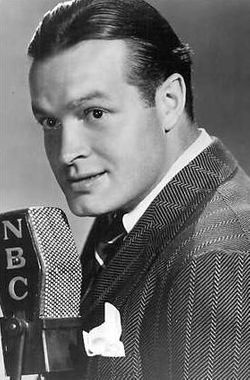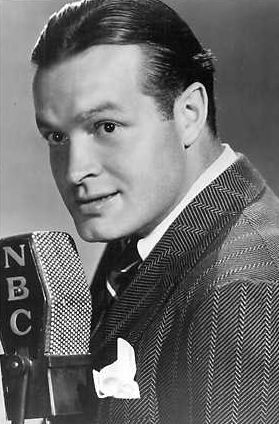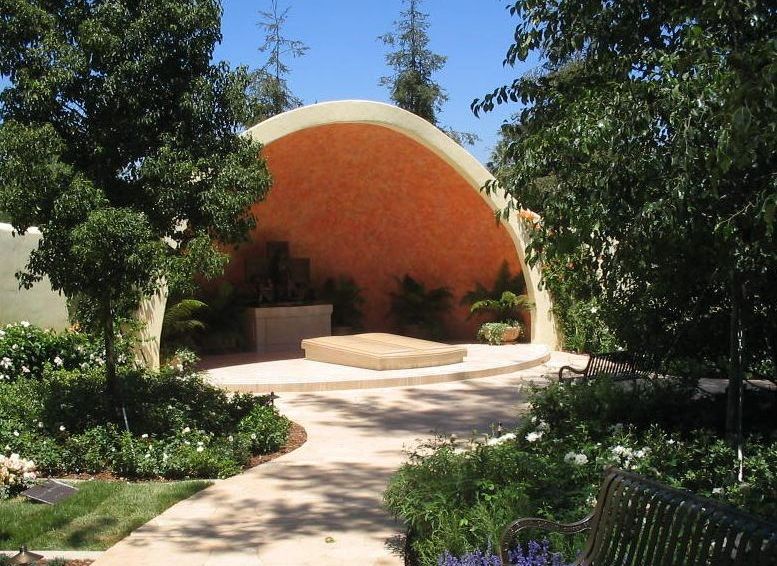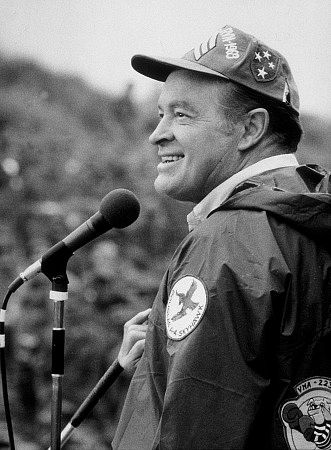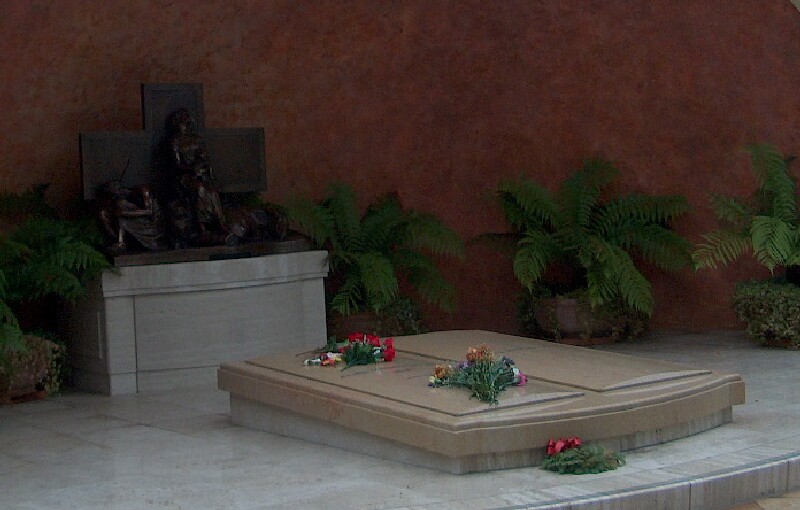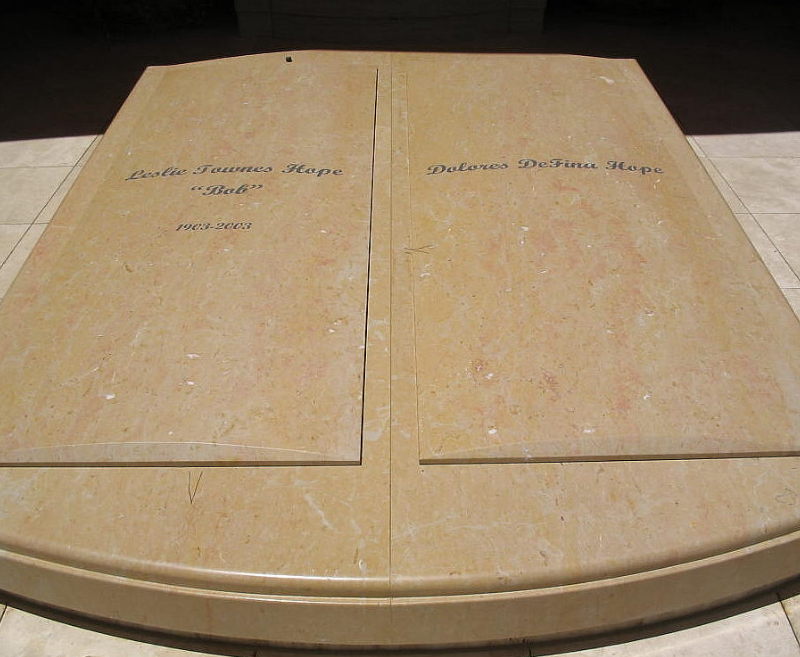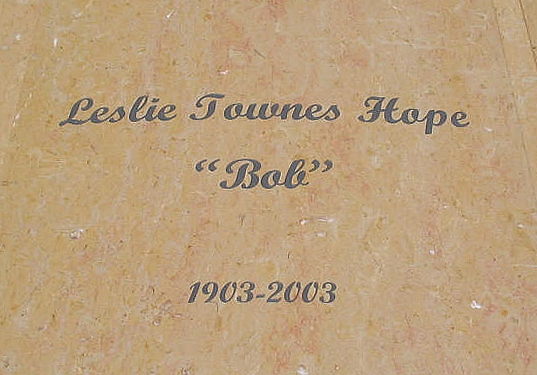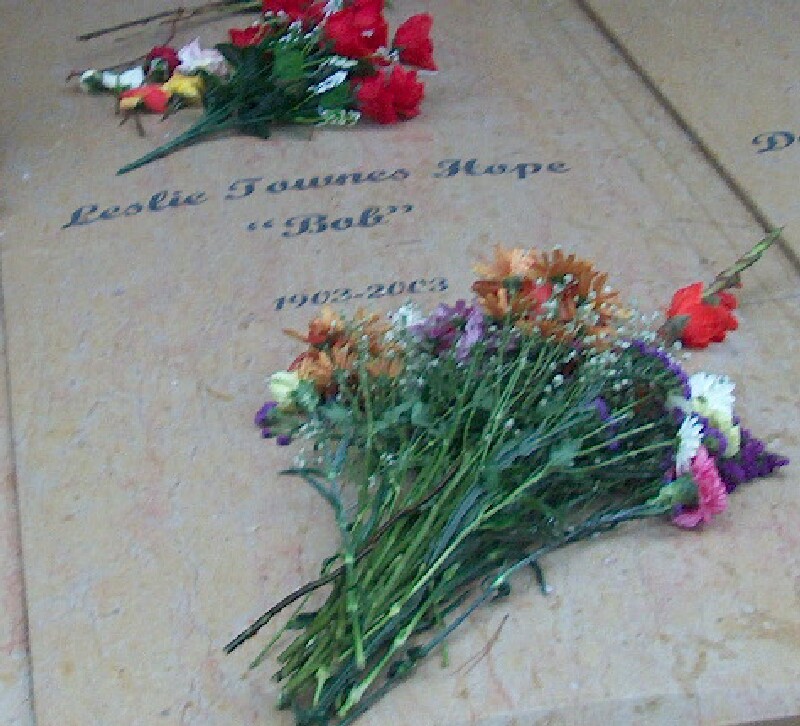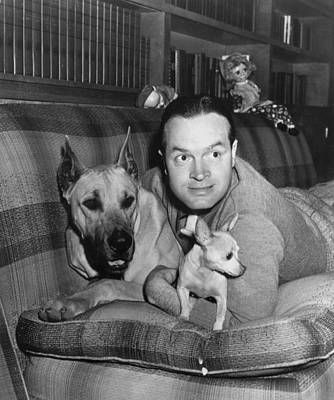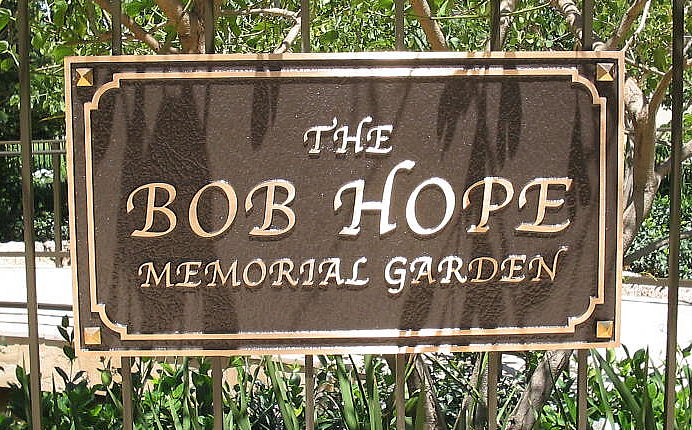Born Leslie Townes Hope in Eltham, near London, England, he was the fifth of seven sons of William Henry Hope and Avis Townes Hope. His English father was a stonemason, and his Welsh mother was an aspiring concert singer. In March 1908, he immigrated with his parents to Cleveland, Ohio. He reportedly changed his name to Bob when his early classmates teased him over his first name.
He became a United States citizen in 1920. After a variety of jobs that included boxer (under the name Packy East), dancer, and comedian on vaudeville, he worked for a while on Broadway and made a number of comedy shorts in New York during the early 1930s. He starred on the radio show "The Pepsodent Show" in 1938, and made his first feature film debut that year, "The Big Broadcast of 1938," in which he and Shirley Ross sang "Thanks for the Memories," a tune that would become his signature theme song.
He continued making films throughout his career. Some became notable in the public's memory, including a series of "Road" films, starting with the hit "Road to Singapore" (1940) with Bing Crosby and Dorothy Lamour. Several additional "road" films were made, including "Road to Zanzibar" (1941), "Road to Morocco" (1942), "Road to Utopia" (1945), "Road to Rio" (1947), "Road to Bali" (1952), and "Road to Hong Kong" (1962). He tried writing films, but stopped after his first, "Paris Holiday" (1958), and produced four films, two in the late 1950s and two in 1976.
Hope continued to make movies and also began a television career in 1950 with his first special, a run that would go for the next 40 years. He worked in films and on TV with many of the industry greats, including Bing Crosby, Paulette Goddard, Dorothy Lamour, Lucille Ball, Jack Benny, Jimmy Durante, George Burns, and Jackie Gleason, and even had a cameo on "Spies Like Us" (1985), with Dan Aykroyd and Chevy Chase.
Beginning in May 1941, Hope became involved with the United Services Organization (USO), and organized entertainment for the troops during World War II, the Korean War, the Vietnam War, and the Gulf War, stopping only in 2001. He even organized entertainment for the troops between the wars, and served as the USO Entertainment Coordinator from 1941 until 2001, finally relinquishing his position to Wayne Newton. Because of his overwhelming patriotic stance, he was made an honorary veteran by an Act of Congress in 1997 and was given an honorary knighthood (CBE) by Queen Elizabeth II in 1976. Queen Elizabeth also made him an honorary Knight Commander of the British Empire (KBE) in 1998, in recognition of his contribution to film, song, and to the entertainment of troops.
Bob and his wife, Dolores, endowed the Our Lady of Hope Chapel at the National Shrine of the Immaculate Conception in Washington, D.C. The chapel was dedicated in May 1994. Bob converted to Catholicism at age 93. He died of pneumonia at age 100 on July 27, 2003.
Born Leslie Townes Hope in Eltham, near London, England, he was the fifth of seven sons of William Henry Hope and Avis Townes Hope. His English father was a stonemason, and his Welsh mother was an aspiring concert singer. In March 1908, he immigrated with his parents to Cleveland, Ohio. He reportedly changed his name to Bob when his early classmates teased him over his first name.
He became a United States citizen in 1920. After a variety of jobs that included boxer (under the name Packy East), dancer, and comedian on vaudeville, he worked for a while on Broadway and made a number of comedy shorts in New York during the early 1930s. He starred on the radio show "The Pepsodent Show" in 1938, and made his first feature film debut that year, "The Big Broadcast of 1938," in which he and Shirley Ross sang "Thanks for the Memories," a tune that would become his signature theme song.
He continued making films throughout his career. Some became notable in the public's memory, including a series of "Road" films, starting with the hit "Road to Singapore" (1940) with Bing Crosby and Dorothy Lamour. Several additional "road" films were made, including "Road to Zanzibar" (1941), "Road to Morocco" (1942), "Road to Utopia" (1945), "Road to Rio" (1947), "Road to Bali" (1952), and "Road to Hong Kong" (1962). He tried writing films, but stopped after his first, "Paris Holiday" (1958), and produced four films, two in the late 1950s and two in 1976.
Hope continued to make movies and also began a television career in 1950 with his first special, a run that would go for the next 40 years. He worked in films and on TV with many of the industry greats, including Bing Crosby, Paulette Goddard, Dorothy Lamour, Lucille Ball, Jack Benny, Jimmy Durante, George Burns, and Jackie Gleason, and even had a cameo on "Spies Like Us" (1985), with Dan Aykroyd and Chevy Chase.
Beginning in May 1941, Hope became involved with the United Services Organization (USO), and organized entertainment for the troops during World War II, the Korean War, the Vietnam War, and the Gulf War, stopping only in 2001. He even organized entertainment for the troops between the wars, and served as the USO Entertainment Coordinator from 1941 until 2001, finally relinquishing his position to Wayne Newton. Because of his overwhelming patriotic stance, he was made an honorary veteran by an Act of Congress in 1997 and was given an honorary knighthood (CBE) by Queen Elizabeth II in 1976. Queen Elizabeth also made him an honorary Knight Commander of the British Empire (KBE) in 1998, in recognition of his contribution to film, song, and to the entertainment of troops.
Bob and his wife, Dolores, endowed the Our Lady of Hope Chapel at the National Shrine of the Immaculate Conception in Washington, D.C. The chapel was dedicated in May 1994. Bob converted to Catholicism at age 93. He died of pneumonia at age 100 on July 27, 2003.
Bio by: Kit and Morgan Benson
Family Members
Advertisement
See more Hope memorials in:
Records on Ancestry
Advertisement
